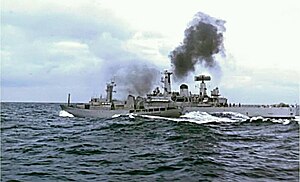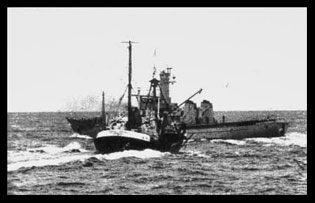 |
| HMS Scylla and Odinn collision (Photo credit: Wikipedia) |
The conflict arose when Iceland expanded its fishing limits beyond its territorial waters, from 4 miles off the coast to 12 miles off the coast of Iceland. The Coast Guard then attempted to enforce overfishing regulation, often cutting the nets of British trawlers.
To protect the rights of British fishermen, the UK declared its plans to guard those rights with the support of warships. This initiated the First Cod War, lasting from September 1st to November 12th, 1958. Many small confrontations occurred during this time, including ships ramming each other and an Icelandic patrol vessel, V/s Ægir, firing three shots at the British trawler Kingston Emerald.
The war saw an impressive 37 Royal Navy ships/7000 soldiers for the UK protecting fisherman from 6 Icelandic gunboats/100 coast guards. At the end of the first war in November, the two powers signed an agreement that any conflicts between them would be sent to the International Court of Justice.

The next war lasted over a year, from September 1972 to November 1973. It was initiated when Iceland extended its fishing limits to 50 miles off the coast of Iceland. Many British trawlers continued to fish their on the first day of the new legislation, but the Icelandic government would not have it. The new leftist government chose to forgo the International Court of Justice, claiming not to be bound by the agreements of the former center-right government. An Icelandic patrol vessel chased 16 trawlers outside of the 50 mile border.
The Icelandic coast guard proceeded with net cutting any non-Icelandic vessel within the 50 mile zone. One such confrontation with the British trawler Peter Scott had British fishermen throwing coal, garbage, and a large fire axe at the Coast Guard ship. By May 17, British fishermen returned to the Icelandic fishing zone with warships. Finally, November 8th, a treaty was signed. As both countries were NATO (North Atlantic Trade Organization) allies, NATO helped them reach an agreement. The British withdrew their warships and agreed to fish within only certain sectors of Iceland's 50-mile fishing border, as well as agreeing to catching no more than 130,000 tons in a year.
But this agreement expired in November 1975, beginning the Third Cod War. Iceland once again increased its fishing borders to 200 miles off the coast, which the British did not recognize. British trawlers continued to fish within the zone and had their nets cut by Iceland Coast Guard vessels. Such incidents led to ramming between the opposing ships. A December 11th incident, in which the Icelandic Þór chased 3 British ships out of range, the British ships teamed up in ramming the Þór and caused the vessel genuine damage. In return, the Þór shot two rounds, one blank and one live, the latter hitting one of the British ships.
Another such incident with ramming ships caused the British to send in 22 warships and more supply gates and men, which Iceland responded to with a smaller number of vessels. However, Iceland attempted to receive supplies from the US and was denied, then turned to the Soviets. Iceland also threatened to close a NATO base which would severely detriment NATO's ability to defend the Atlantic from the Soviet Union. The dramatic measure caused the British to agree to keep its fisherman out of the 200 mile Icelandic fishing zone. Even after the outcome was decided, on May 6th, another serious ramming incident and manning of the Icelandic vessel's guns occurred.
In the end, Iceland acchieved its goals. The strict limit on British fishing harshly hit the northern fishing port economies in the UK. In 2012, the UK attempted to compensate 2500 fisherman who had lost their jobs those 35 years ago with £1,000. Thankfully, this odd war had no casualties.
Sources: Wikipedia, Britain's Small-Wars, Kwintessential

No comments:
Post a Comment